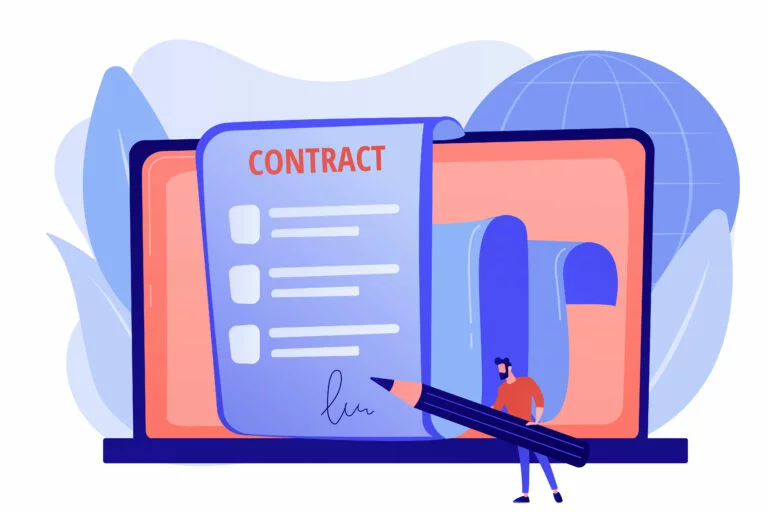Contract authoring is a critical step in the contract lifecycle management process. It involves the creation of agreements and the implementation of contract terms into written contracts. Efficient contract authoring is essential for businesses to ensure that their contractual relationships are properly documented, legally compliant, and effectively managed.
In this blog, we’ll look at important tips for writing contracts well. We’ll talk about why contract writing matters, ways to do it effectively, how technology helps, and how to deal with common problems. Also, we’ll explore contract authoring software and its benefits, and how it’s linked to managing contracts throughout their life.
Following these tips and using the right tools, businesses can make contract writing easier, work faster, and lower risks linked with handling contracts.
Understanding Contract Authoring

Understanding the basics of contract authoring is essential for businesses to effectively manage their contract lifecycle. The authoring process involves creating written contracts that reflect the terms and conditions agreed upon by the contracting parties.
It involves writing the contract, saying what each person should do, and making sure it can be enforced by law. This writing sets up everything for the contract’s life, so it’s crucial to understand and do it well.
Importance of Contract Authoring
The importance of contract authoring cannot be overstated in the contract lifecycle management process. Contract authoring is the stage where contract parties implement the terms of a contract into a written document. It involves centralizing contract clauses, contract key dates, contract documents, and other associated data. Effective contract authoring ensures that contracts are legally compliant, properly structured, and accurately reflect the intentions of the contracting parties.
A well-executed contract authoring process is crucial for businesses to manage their contract lifecycle efficiently. It helps reduce the risk of misunderstandings, disputes, and non-compliance with legal requirements. Also, contract management software helps keep important contract information safe and easy to find, making it simple to manage contracts efficiently.
Related Article: What Is Contract Automation? A Comprehensive Guide
How are CLM and Contract Authoring related?

Contract Lifecycle Management (CLM) and contract authoring are related processes that work together to manage contracts throughout their lifecycle. CLM encompasses the entire lifecycle of a contract, from creation to expiration or termination. Contract authoring is a part of managing contracts where the agreement is made and put into writing. It’s like the step where everything gets written down and made official.
Contract authoring is a key component of CLM as it sets the foundation for the entire contract lifecycle. It involves creating contracts, specifying the rights and obligations of each party, and ensuring legal compliance. By effectively managing the contract authoring process, businesses can streamline their contract management and ensure successful contract performance.
Strategies for Effective Contract Authoring

Implementing a Clear and Concise Language
Implementing clear and concise language in contracts is crucial to avoid misunderstandings and disputes. Contracts should be written in a language that is easily understood by all parties involved. Using simple words instead of complicated legal language makes sure that everyone can understand the contract easily.
It’s like using everyday words instead of big, confusing ones, so everyone knows exactly what the contract says. Clear and concise language also facilitates effective communication and reduces the risk of misinterpretation.
Besides using clear language, it’s crucial to organize contract information neatly. Structuring the contract with headings, subheadings, and bullet points makes it easier to read and understand. This way, everyone involved in writing the contract can easily see what they need to do and what they’re responsible for. It’s like having a roadmap that guides everyone smoothly through the contract process.
The Role of Templates and Clause Libraries
Templates and clause libraries play a significant role in effective contract authoring. Templates provide a starting point for creating contracts by including standardized language and predefined sections. They ensure consistency and accuracy in contract terms, reduce the time spent on drafting contracts from scratch, and help streamline the authoring process.
Clause libraries are essentially like treasure troves filled with pre-approved sections ready to be inserted into contracts. Picture them as shelves stacked with language that’s been carefully reviewed and given the green light by legal experts. This ensures that contracts not only meet legal standards but also follow the best practices. By tapping into these templates and libraries, businesses can speed up their contract writing process, steer clear of errors, and make the whole process smoother and more efficient.
Furthermore, a centralized clause library allows for easy access to approved language and ensures that all contracts within an organization are consistent and compliant. This helps mitigate risks and improves the quality and accuracy of contract terms.
Ensuring Legal Compliance and Risk Management
Ensuring legal compliance and effective risk management are crucial aspects of the contract authoring process. Legal compliance involves adhering to applicable laws, regulations, and industry standards when drafting and finalizing contracts.
Risk management in contract writing means spotting and reducing possible problems that could come from the contract terms. This includes looking at financial, operational, and legal issues that could happen because of the contract and finding ways to lower those risks. It’s like checking a road for potholes before driving to avoid any bumps along the way. Legal teams with expertise in contract law and risk management can provide valuable insights and guidance in this regard.
Related Article: Contract End Date: When Does Your Contract End?
Leveraging Technology in Contract Authoring

Leveraging technology in contract authoring can significantly improve the efficiency and effectiveness of the process. Contract Management Software and other technological tools can automate repetitive tasks, streamline document creation, and enhance collaboration among contract stakeholders.
The Advantages of CLM Software
CLM software provides numerous advantages for businesses engaged in contract management. It offers a centralized platform for creating, editing, and managing contracts, eliminating the need for manual processes and reducing the risk of errors. A robust contract management software like Volody enables organizations to streamline their contract authoring process, improve efficiency, and ensure consistency in contract terms.
Additionally, a CLM software often includes features such as contract templates, clause libraries, workflow automation, and integration with other business systems. These features enhance productivity, reduce manual effort, and facilitate collaboration among contract stakeholders. By leveraging CLM software, businesses can optimize their contracting processes, improve risk management, and achieve greater operational efficiency.
Integration with Other Business Systems
Integration with other business systems, such as CRM and procurement software, is crucial for seamless contract authoring and management. Integrating contract authoring software with other systems allows for the automatic transfer of data between different platforms, eliminating the need for manual data entry and reducing the risk of errors.
For example, integrating contract authoring software with CRM software enables contract stakeholders to access customer data and other relevant information directly from the CRM system. This integration streamlines the contract authoring process, improves data accuracy, and enhances collaboration between sales teams and legal departments. Similarly, integration with procurement software allows for the seamless creation and management of vendor contracts, ensuring compliance with procurement policies and procedures.
Related Article: How To Create Contracts In CRM With CLM Integration
Overcoming Common Challenges in Contract Authoring

Contract authoring can present several challenges that need to be overcome for successful contract management. These challenges include handling complex contracts and negotiations, addressing changes and amendments efficiently, and ensuring consistency across all contracts.
Handling Complex Contracts and Negotiations
Handling complex contracts and negotiations requires careful attention to detail and effective communication between contract stakeholders. Complex contracts may involve multiple parties, intricate terms and conditions, and extensive negotiations. It is important to have a clear understanding of the contract objectives, identify potential risks, and ensure that all parties involved are aligned on the contract terms.
Effective communication and collaboration among stakeholders are crucial in handling complex contracts. Regular meetings, clear documentation of negotiations, and setting realistic timelines can help streamline the negotiation process and ensure that all parties are on the same page.
Additionally, CLM software such as Volody, can simplify the management of complex contracts by providing a centralized platform for collaboration, version control, and document sharing. By addressing the challenges associated with complex contracts and negotiations, businesses can ensure successful contract authoring and management.
Addressing Changes and Amendments Efficiently
Addressing changes and amendments efficiently in the contract authoring process requires effective communication and coordination among contract stakeholders. Changes and amendments may arise due to evolving business requirements, regulatory changes, or unforeseen circumstances. It is important to have a well-defined process in place for managing changes and amendments to ensure that all parties are aware of the modifications and that the contract remains legally compliant.
Utilizing tools such as version control and approval workflows can streamline the process of addressing changes and amendments. Version control ensures that all changes are properly documented and tracked, while approval workflows facilitate the review and approval of modified contract terms.
By addressing changes and amendments efficiently, businesses can ensure that contracts remain up-to-date, legally compliant, and reflective of the evolving needs of the contracting parties.
Ensuring Consistency Across All Contracts
Ensuring consistency across all contracts is crucial for effective contract management. Consistency means making sure all contracts match the organization’s rules, follow the law, and have the same terms and conditions that everyone agrees on.
One way to ensure consistency is by using contract templates that contain standardized language and predefined sections. Templates provide a starting point for creating contracts and help maintain consistency in contract terms across different agreements. By utilizing a centralized clause library, businesses can ensure that approved language is consistently used in contracts, reducing the risk of errors and misunderstandings.
Visibility and access to contract data are also important for maintaining consistency. Contract management software can provide a centralized repository for storing and managing contracts, allowing for easy access, tracking, and monitoring of contract terms and obligations.
By implementing strategies to ensure consistency, businesses can effectively manage their contracts, reduce risks, and improve overall contract performance.
Related Article: Contract Management Software Free Trial: Try AI CLM Software
Frequently Asked Questions
What is the difference between contract authoring and contract management?
Contract authoring means writing down the terms of a contract and making it official. Contract management is taking care of the contract from the time it’s written until it’s done or stopped. It’s like making sure everything in the contract happens smoothly from start to finish.
Can small businesses benefit from contract authoring software?
Yes, small businesses can also gain from using contract writing software. This software makes writing contracts easier and faster, and it helps make sure everything is legal, no matter how big or small the business is.
How often should contract templates be reviewed?
Contract templates should be reviewed periodically to ensure that they remain up-to-date and compliant with legal requirements. Regular reviews, audits, and updates are essential to maintain the accuracy and effectiveness of contract templates.
What are the best practices for securing contracts?
Securing contracts involves utilizing measures such as electronic signatures (eSignatures), ensuring compliance with legal requirements, and implementing data protection measures to safeguard contract data.
Conclusion
In conclusion, writing contracts well is super important for businesses to run smoothly. By knowing the basics, using smart plans, and using helpful technology like contract writing software, companies can make their processes easier and follow the law.
Dealing with tough stuff, like tricky contracts and keeping everything consistent, is crucial for managing contracts well. By linking contract writing tools with other business systems, companies can work better and lower risks. Stay updated on the newest trends and tips in contract writing to make your workflow better and make your business thrive.





